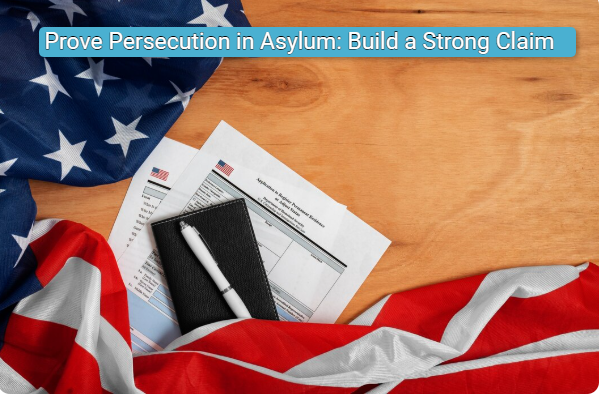How to Prove Persecution in Your Asylum Claim: What You’re Missing in Your Evidence
At Passage Immigration Law, we’ve sat across from people who carry thick folders filled with hospital records, police reports, and news clippings. And still, the question comes: “Is this really enough to prove what I went through?”
That’s the reality of seeking asylum in the USA. Your experiences may be real, your fear undeniable, but the asylum system doesn’t ask only for your truth. It asks for proof. And not just any proof, but evidence that fits into very specific boxes set by United States asylum law.
We’ve seen how overwhelming this feels. Many asylum seekers in the United States believe their testimony alone should carry the day. But in practice, cases succeed or fail on the strength of the evidence you can gather, organize, and connect to the legal definition of persecution.
What Persecution Really Means

One of the hardest lessons for asylum seekers in America is that not everything painful counts as persecution. The law requires that the harm be serious: detention, torture, threats to your life, severe restrictions on your freedom, and that it happened because of one of five protected reasons:
- Race
- Religion
- Nationality
- Political opinion
- Membership in a particular social group
This is what separates those who qualify for asylum in the United States from those who don’t. Being insulted, excluded, or even losing a job because of bias may feel unbearable, but under the law, it may not reach the level of persecution. That’s why evidence is so critical: it shows decision-makers that your story meets the legal standard.
The Nexus: Showing Why It Happened
In every claim, there’s a question officers and judges look for: Why did this happen to you?
That “why” is called nexus. It’s the link between the harm you suffered and a protected ground. Without it, even the most horrifying story can fail under asylum in the United States.
For example, if the police arrested you during a protest, you must show that it was because of your political opinion. If you were threatened by neighbors, you must connect it to your religion or social group. And if gangs targeted you, you need to explain how that ties to your political stance or identity, not just random violence.
At Passage Immigration Law, we help clients make this connection clear because it’s the piece most often missing in asylum seekers’ United States cases.
What Evidence Really Matters
When you’re applying for asylum in the USA, your words matter, but they are rarely enough by themselves. Officers expect to see supporting records that tell the story alongside you.
Here’s what strong evidence looks like:
- Medical and legal records: hospital reports, arrest warrants, court documents.
- Witness affidavits: written statements from family, neighbors, or colleagues who saw threats or attacks.
- Country condition reports: U.S. State Department findings, NGO publications, or news coverage showing persecution of people like you.
- Membership proof: evidence of political activism, religious participation, or belonging to a persecuted group.
Without these, your case can look incomplete. With them, your testimony gains weight and credibility.
Where Strong Cases Go Wrong

We often review cases that were denied, and the same patterns appear again and again:
- Vague testimony: saying “I was threatened” without details of who, when, and why.
- No nexus: harm described but never tied to a protected ground.
- Missing corroboration: no medical reports, no witness statements, no country reports.
- Inconsistencies: dates or details that change between the asylum interview and court.
These are the gaps that keep many asylum seekers in the US from winning their claims, not because their experiences weren’t real, but because the evidence didn’t meet the standard.
Country Conditions: The Bigger Picture
When you seek asylum in the USA, your story matters, but officers also ask: Is this happening to others like you?
That’s where country condition evidence comes in. It shows that your experience isn’t an isolated incident, but part of a wider pattern.
For example:
- Political opponents are being jailed across your country.
- Marginalized religious groups are facing widespread harassment.
- Reports show that LGBTQ individuals are attacked, and the government is unwilling to protect them.
At Passage Immigration Law, we build this evidence into every claim. It connects your individual truth to the broader context, which is exactly what judges look for in asylum cases in the US cases.
Future Fear: Proving What Hasn’t Happened Yet
Not every applicant has past scars or police reports. Some fled early, before the worst happened. For them, the challenge is proving a “well-founded fear of future persecution.”
Evidence here often includes:
- Threatening letters or online messages.
- Proof that others like you were harmed after you left.
- Expert testimony confirming you would face danger if returned.
The law allows protection based on this forward-looking fear, but only if it’s backed with real evidence.
Why Preparation Changes Everything
The truth is, asylum seekers in the USA often feel the process is unfair because the burden of proof is so high. But preparation changes the outcome.
When your evidence is clear, consistent, and supported, your case stops being just a personal story. It becomes a legal claim that fits the framework of United States asylum law.
At Passage Immigration Law, we don’t just file your application. We sit with you, identify the missing pieces, and help you gather the documents, statements, and reports that make your claim strong.
Don’t Let Evidence Be the Weak Link

Proving persecution is not about exaggerating your story. It’s about presenting your truth in a way that meets the law’s requirements.
For anyone seeking asylum in America, remember:
- Persecution must be serious harm.
- It must be tied to one of the five protected grounds.
- Testimony must be consistent and supported.
- Country evidence must confirm your fear is part of a bigger pattern.
Many asylum seekers in the USA lose cases because one of these pieces is missing. Don’t let that be your story. With the right preparation, your evidence can show the full picture and give you the protection you deserve.
At Passage Immigration Law, we know how heavy this process feels. We’re here to walk with you from the first form to the final decision, making sure nothing important is left out of your claim.
Ready to Strengthen Your Asylum Claim?
At Passage Immigration Law, we know how heavy this process feels. You don’t have to do it alone. Let’s review your evidence, identify the missing pieces, and build the strongest possible claim together. Reach out today to schedule your consultation and take the next step toward protection.
Disclaimer: This article offers general legal information, not legal advice. Do not rely upon this information without seeking legal counsel. If you need legal advice, you may contact us directly to speak with an attorney. We disclaim all liability with respect to actions taken based on any information presented. Every case is different, and outcomes will vary depending on the unique facts and legal issues of your case.







